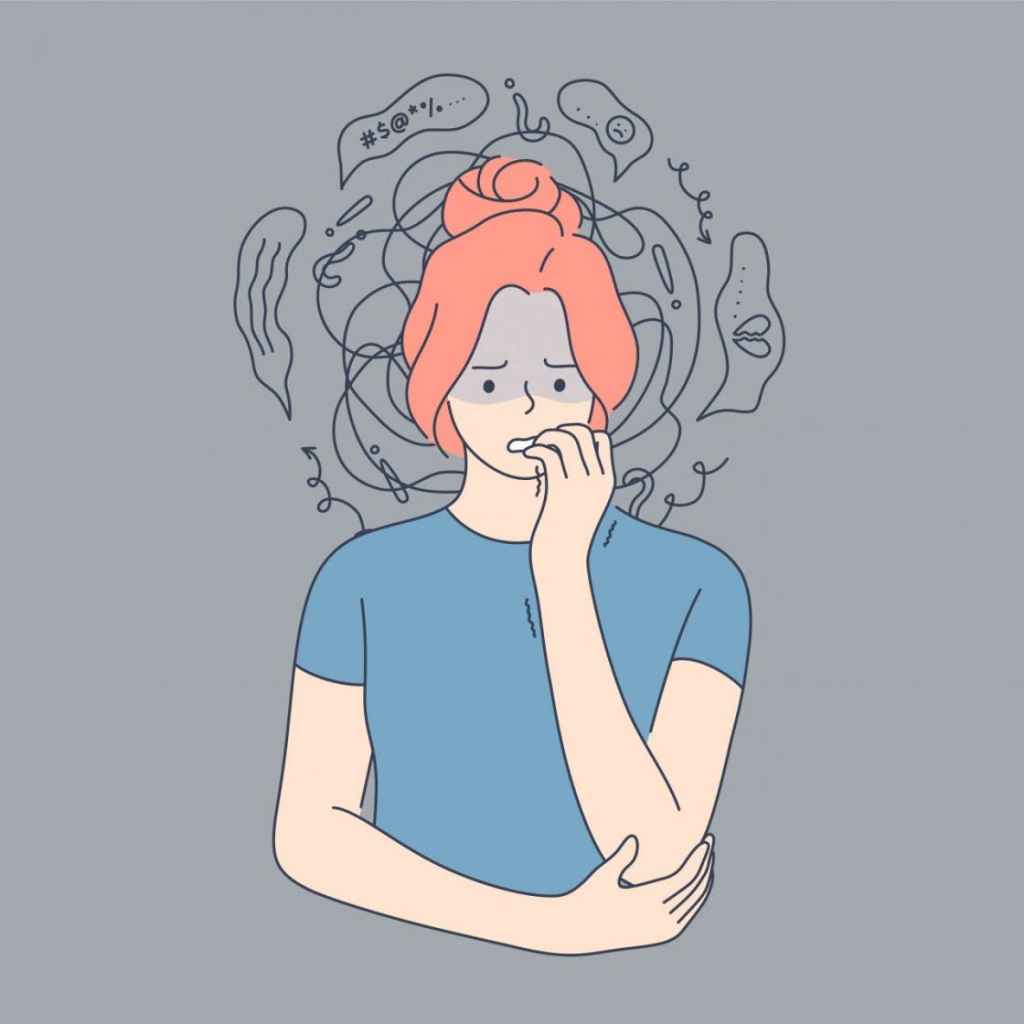As someone who has experienced bouts of anxiety consistently throughout her life, I am here to shed some light, some explanations, and hopefully inspire others to feel less alone. What I’ve learned over time is to slow down, and learn what I can control, but I still struggle to this day. And that’s okay, because healing is a nonstop journey and I hope that I can inspire someone to want to take that journey as well.
It is a completely normal experience to have bouts of anxiety throughout moments in life. It’s ‘normal’ to feel anxious about becoming an adult, a first-time mom, a first-time dad, self-discovery… it’s even ‘normal’ to feel anxious about getting help in general. We all face certain periods of life that will seem to trigger anxiety in us, but when does it become a problem?

For people with anxiety disorders, it’s an everyday struggle of intense, excessive, and persistent worry about everyday situations. Most anxiety disorders include episodes of sudden intense nerves, or fear, that peak quickly (panic attacks).
Anxiety can also be debilitating, stopping people from getting the full experience of life itself. Something that I can easily relate to is the fear of the unknown, and my deep distrust in the public. Examples of these things can include not driving at night, not going to certain places at certain times, and even cutting ties with family (which sometimes isn’t the worst thing to do). The list can go on.
Types of Anxiety Disorders
There’s also a list of different types of anxiety disorders which I will write another blog to go into detail, but here are a list of the many types:
- Generalized Anxiety Disorder
- Social Anxiety Disorder
- Specific Phobias
- Separation Anxiety Disorder
- Agoraphobia
- Anxiety disorder due to a medical condition
- Panic Disorder
- Selective Mutism
- Substance-induced Anxiety Disorder
- Unspecified Anxiety Disorder
- And many more
It is absolutely possible to have more than one type of anxiety disorder!
When Should I See A Doctor?
- If you feel like it’s interfering with your ability to work, your relationships, or other aspects of your life (such as parenting)
- The anxiety is upsetting to you and it’s difficult to manage
- You feel depressed, you find that you need to use illicit drugs/alcohol to function, or have other mental health concerns
- If you feel it could be associated with a physical health issue
- If you are experiencing suicidal thoughts or behaviors – if this is the case, seek emergency help immediately
The sooner, the better. If you feel unsure, make an appointment with your doctor or local mental health program to talk to a doctor about options. It’s easier to manage the sooner you accept help.
What Are The Most Common Symptoms?
- Feeling nervous, restless, or tense
- Having a sense of impending danger, panic, or doom
- Having an increased heart rate
- Breathing rapidly (hyperventilation)
- Sweating
- Trembling
- Feeling weak or tired
- Trouble concentrating or thinking about anything other than the present worry
- Having trouble sleeping
- Experiencing gastrointestinal (GI) problems
- Having difficulty controlling worry
- Having the urge to avoid things that trigger anxiety
Types of Treatments and Therapies
There are many ways of managing anxiety disorders from types of therapy to medication. No one thing is right for everyone so make sure to speak with your doctor or therapist about your personal thoughts regarding treatment.
Psychotherapy
Also known as ‘talk-therapy‘. This type of therapy must be tailored towards the patient’s specific disorder or issues to be effective.
Cognitive Behavioral Therapy
CBT teaches people different ways of thinking, behaving, and reacting to objects and situations that induce anxiety. Cognitive therapy and exposure therapy are normally both used in CBT to treat social anxiety disorder. Cognitive therapy focuses on identifying, challenging, and then neutralizing unhelpful or distorted thoughts underlying anxiety disorders. Exposure therapy focuses on confronting the fears underlying an anxiety disorder to help people engage in activities they have been avoiding. Exposure therapy is sometimes used along with relaxation exercises and/or imagery. These types of therapy can be used on other anxiety disorders as well.
Medication
Medications do not treat anxiety disorders, but they do make the symptoms easier to handle or manage. I will preface that medication is something not to be taken lightly as most medications used for anxiety are habit-forming and can make the condition worse than it is. However, for short periods, this can be a good idea.
Anti-Anxiety Medications
Most commonly known as benzodiazepines. There are both benefits and drawbacks when it comes to these types of medications. They are effective at relieving anxiety symptoms at the moment, and they take effect more quickly than antidepressants that are prescribed for anxiety. However, if you take consistently, you will build a tolerance for them and they won’t work as effectively as they once did. Personally, I have experienced this when I was a young adult and was prescribed many different medications at once. I built a tolerance to medicine, leading me to need to take more to be able to manage the symptoms which later led to a dependency on it. To avoid these issues, doctors will usually only prescribe them for a short period.
Since anti-anxiety medications are habit-forming, it is important to know that if you decide to stop taking them, then it needs to be slowly tapered down until you’ve completely weaned yourself off of them, or else you might experience withdrawal symptoms which will likely trigger the anxiety symptoms to return.
These medications may be needed for long-term use. If so, they should be prescribed on an ‘as-needed’ basis. With new federal regulations on controlled substances, this is something that most doctors won’t do as often but it can be done if the anxiety symptoms cannot be managed easily with other methods.
Antidepressants
Antidepressants are normally prescribed for depression but can help manage anxiety. In my personal case, antidepressants threw off my chemicals so much that it worsened my problems more than helping them, but everyone is different. A common issue that I have seen with antidepressants is that you might need to try out several different antidepressants before you find one that works best for you. I also experienced this, and I feel that it’s almost inhumane in a way. I had so many experiences with so many antidepressants where I landed myself in the psych ward because my body did not handle antidepressants well. It’s very important to know that antidepressants take a minimum of 4-6 weeks to be able to notice a change in your anxiety symptoms. You may also feel that they get worse before they get better.
Just like anti-anxiety medication, these medications also need to be weaned and tapered if you plan to stop taking them because they will cause withdrawal symptoms as well. In some cases, children, teens, and young adults under the age of 25 may experience an increased number of suicidal thoughts when using antidepressants and should be supervised often during treatment for this reason. Do not be afraid to talk to your doctor.
Beta Blockers
Beta-blockers are normally used for high blood pressure but can be effective at managing certain physical symptoms of anxiety such as rapid heartbeat, shaking, trembling, and blushing. These are used as a preventive intervention for such anxiety attacks.
Is It Right For You?
As always, talk with your doctor about any concerns you have about using any sort of medication. Like I’ve said before, everybody is different and what works for one person might not work for another person.
It’s also good to know that there could be other factors that exacerbate anxiety symptoms such as smoking, drinking caffeine, cold medicines, herbal supplements, and illicit drugs. These things can also interfere with how these other medicines can work, so as always, talk to your doctor.
Here are a few examples of what you and your doctor could (and should) discuss:
- How well medications are working or might work to improve your symptoms
- Benefits and side effects of each medication
- Risk for serious side effects based on your medical history
- The likelihood of the medications requiring lifestyle changes
- Costs of each medication
- Other alternative therapies, medications, vitamins, and supplements you are taking and how these may affect your treatment; a combination of medication and psychotherapy is the best approach for many people with anxiety disorders
- How the medication should be stopped (Some drugs can’t be stopped abruptly and must be tapered off slowly under a doctor’s supervision).
Support Groups
Joining a support group is probably one of the easiest things that you can do to help manage symptoms or gain some insight without a doctor’s visit. Normally, it’s free too. You can check your local mental health programs for more information or you can visit our resources page for support groups in your area, or you can feel free to jump into the Eradication Wellness Support Group every Wednesday night on Google Meet.
Stress Management Techniques
Techniques such as meditation are great to know for those moments when you’re suddenly hit with these symptoms. They are great methods at managing anxiety, but should never replace therapy.
